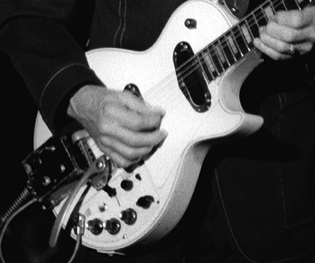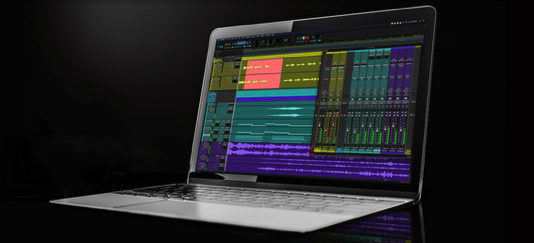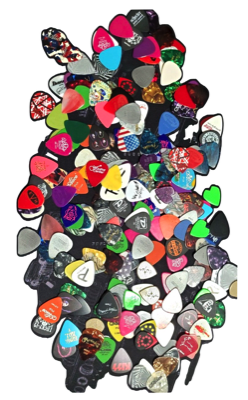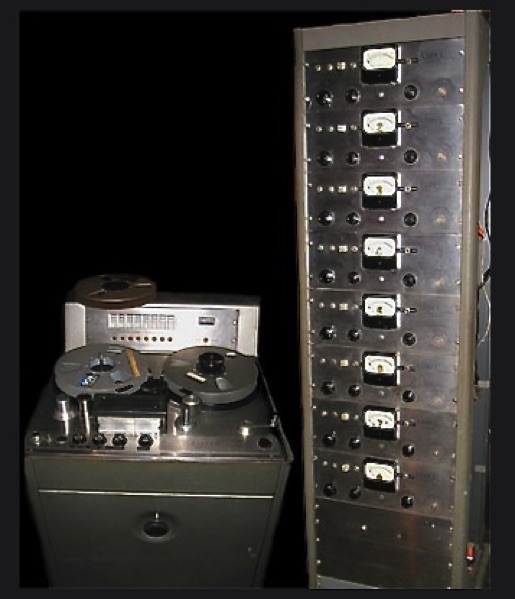I remember one night walking into the home studio control room and seeing Dad with his guitar on his lap, removing the pickups. He smiled at me and asked if I would want to go on a tangent with him. Right away, I knew what that meant and couldn't wait to be working on another one of his guitar experiments.
This time, he sent me to the basement with a list to hand wind some pickup coils, each with a slightly different number of windings. After I finished my basement duties, we tested them and noticed a definite difference in the sound from each coil. Dad would spend hours upon hours working on the most minute details, moving the pickups a millimeter, using different coil combinations, and even changing the strength of the magnets. No detail was unimportant, including making his own picks.

Grandma was a formidable woman, and her role in Dad's life could not be overstated. When she suggested something to Dad, he would move heaven and earth to accommodate her. So when she said she couldn't tell the difference between him and another guitar player on the radio, it set him off on one of his biggest tangents, leading him to his breakthrough, "New Sound." With Dad's curiosity piqued, his next big challenge was bringing this new sound to his live stage show audience. The solution was what he called the "Lespaulverizer."
Dad was never one to compromise when it came to recording his guitar and Mary's vocals. He would go to great lengths to avoid using any types of compression, limiting, and even equalization was off the table. On many a session, I would watch him use a technique that he developed that would keep the natural expression with the purity and presence that his guitar delivered with its sonic magic. To achieve such clarity, Dad would use his custom-built lo-impedance guitar directly into the mixer with only a volume pot in the line and then directly into the multi-track recorder.
I remember on one such occasion; Dad was recording a bass part on his guitar by watching the bass level on a separate VU meter while he recorded. If a note were too low on the meter, he would play that note louder the next time and keep the natural expression he loved so much. Dad applied the same principle to Mary's vocals. One of the biggest takeaways I learned from working with Dad at the family studio was his approach to equalization.... he was against it. Dad always made sure to match the correct microphone to the source he was recording. He would say there was no need for a mic that goes from 20 to 20K Hz. when the instrument only goes from 800 to 6K Hz. Eliminating anything in the recording channel that took away from the original sound was to be avoided whenever possible. This philosophy served Dad well and allowed him to produce the sonically outstanding recordings that are still admired today.
For more on his recording techniques, go to
The New Sound page, The Evolution Of The New Sound at LesPaulRemembered.com
Dad seemed always to be thinking of the next thing, even while still working on his current endeavor. It was just part of his make-up. The first time I heard him mention the multi-track recording concept was while on a break filming the Listerine TV show in Brooklyn, New York. It started with his usual curious fascination with the technical challenges and, as usual, took form as a practical idea over time. He would say, "You'd have to be stupid to do what I did." Motivated by his experience with the disc-to-disc and mono tape machine, which worked very well for him, he realized the next generation needed a device that they could create music without the technical restraints he had to contend with. After working out the details, he was ready to sit down with Ampex and lay out his vision. It took a few years and a lot of back-and-forth feedback with Ampex before Dad received the first 8-track machine he envisioned.
I hope you enjoyed my personal recollections in Part 1. Part 2 takes us to the kitchen table with Dad reminiscing about his incredible journey and how it all started.
I was lucky enough to experience its impact on the audience while playing drums with Dad and Mary in the live stage show. It also almost gave me a hernia carrying the heavy equipment cases it took to pull it off.
When I pressed Dad on how he came up with all of the guitar parts and Mary's vocals for the show, he explained that he had to re-record all of his hit tunes...no easy feat. Duplicating what he originally played when he was using the Sound On Sound and Disc To Disc techniques, but this time leaving off his lead guitar and Mary's guitar and lead voice so they could perform those parts live. At the time, it was a very revolutionary concept. From today's perspective, I look back at what it took to recreate all of those parts from sheer memory, and it never fails to amaze me how disciplined and talented Les and Mary were.


The whole story is on The Inventor,
The Multi Track Recorder page at LesPaulRemembered.com



After a visit from his good friend Tommy Dowd, the second machine went to Atlantic Recording Studios in New York, the first commercial studio to own the 8-track recorder whose first session was with the "Coasters."
As I mentioned, Dad always had an eye for what's next. He would say, "In the future, you will be able to record or mix anywhere. In the kitchen, your bedroom, or even your basement." And as you can see with the recording gear today, you can even mix on an airplane. Dad saw this one comin'.
I've been working on my Dad's tribute website for some time now, and so many memories of growing up with him have resurfaced. It's been said as a young boy, he was very curious, and that's true. Growing up and working with my Dad made me realize he never outgrew his childhood fascination with how things worked. He was always trying to improve something or invent what he needed while constantly improving himself. Curiosity, patience, and being a great listener were an asset and the guiding principles throughout his life.... it was in his DNA.
Here are some of my personal favorite memories with Dad...
CHASING HIS SOUND

Dad ended up dedicating his whole life searching for the sound he heard in his head. I believe Dad never actually wanted to finish experimenting on his guitar; He just loved the journey too much.
The whole story is on The Inventor -
The Solid Body Electric Guitar page at LesPaulRemembered.com
LES AND HIS AUDIENCE
LES KNEW THERE HAD TO BE A BETTER WAY...
UNCOMPROMISING SOUND
